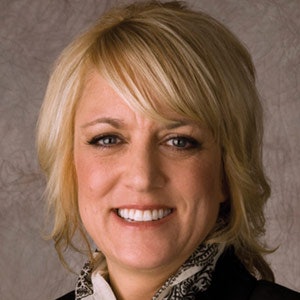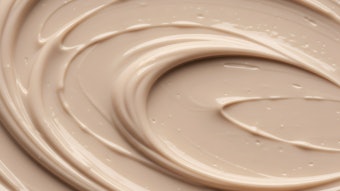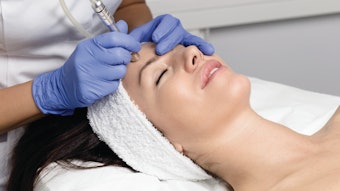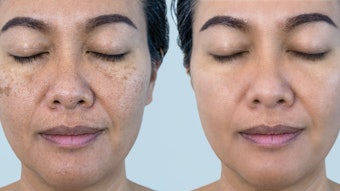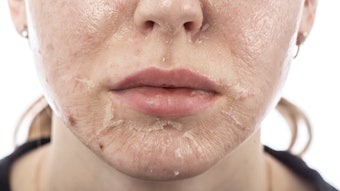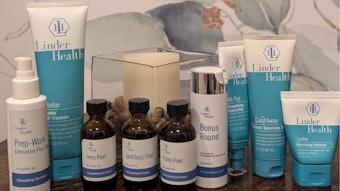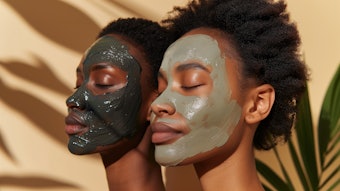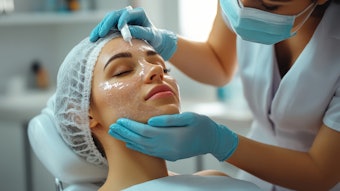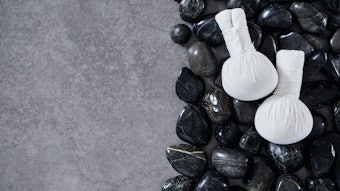
Over 30 million people have some form of eczema,1 and skin care professionals are seeing more of this in the treatment room. In many, eczema started in childhood and dissipated by adulthood; however, adults that never had it as a child are presenting the condition in growing quanitities. Since skin care professionals do not want to “do harm” in the treatment room or provide the wrong home care, we need to look at safe treatments, ingredients and ways to work with medical professionals when necessary to achieve the optimum results.
Eczema really never goes away; however, the symptoms can be managed.
Recognizing Symptoms
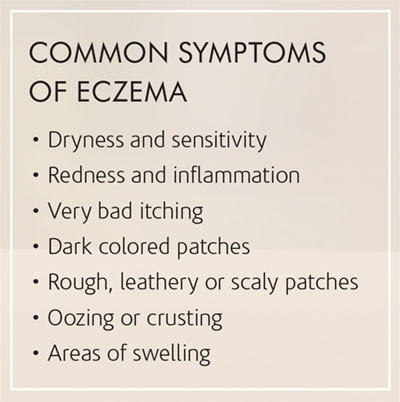
If an esthetician recognizes signs and symptoms of eczema (see Common Symptoms of Eczema, they should refer the client to a physician to make a final decision. Even if you are sure a client has eczema, it is best to send them for diagnosis first.
Atopic dermatitis is another name we may possibly use when speaking of eczema. When the eczema symptoms are present, the itching sensation can range from mild to severe. There can also be a cycle of itching called the “itch-scratch cycle,” where the itching goes from mild to severe scratching of the area until it bleeds.
Causes and Triggers
Eczema can be caused by one or more factors. It can be caused by a gene dysfunction that compromises the skin’s barrier function or if the immune system is not functioning properly. If the skin is dry, sensitive or reactive, it will also lead to the barrier function being compromised. Bacteria such as Staphylococcus aureus can create a film on skin that blocks sweat glands. There is also research suggesting that those in the same family can have eczema.
Understanding what might trigger a flare-up will also be helpful. These may include any or combinations of the following:
- Hormones
- Stress
- Environment
- Diet
- Sweating
- Medications
- Infections
- Allergens in clothes, household products or personal care items
Recognizing these triggers, especially allergens, and identifying beneficial treatments can help a skin care professional ensure a happy client.
Ingredients to Avoid
Clients with eczema should avoid known allergens. Sometimes these include common fragrances in personal care products and household products. In addition, care should be taken with using vitamin A derivatives.
Fragrances. Fragranced cosmetics, personal care items and household products should be avoided. Just because that product lists “fragrance-free” or “unscented” does not mean totally safe, as they only imply there is no apparent scent.2 Many manufacturers use essential oils to cover up the natural scent of a product that may be unpleasant, which are called masking scents.
Also remember to be aware of the fragrances in the treatment room on the sheets and linens. Since sensitive skin is on the rise and fragrance allergies are more common, consider using detergents free of added fragrance. This would not only benefit the client with eczema, but also someone with hormonal issues, migraines and even undergoing treatment for cancer, as all of these are susceptible to fragrance triggers.
Vitamin A derivatives. Be careful with forms of vitamin A on a client with eczema. The compromised barrier allows vitamin A derivatives to penetrate the layers much faster. This will most likely cause a severe reaction of redness and peeling, which are not desired for this type of skin sensitivity. If a client is interested in vitamin A, a suggestion would be to get the barrier as healthy as possible and use a form of vitamin A such as retinaldehyde. Retinaldehyde is a bioavailable form of vitamin A, which works on cellular renewal and normalization, anti-wrinkle and UV repair.3 However, we must remember to always work with the client’s physician to know if there are any other medications for eczema or any other health challenges that may be contraindicated to vitamin A.
Beneficial Ingredients
Since the goal in eczema treatment is to heal and restore the barrier, antimicrobials, barrier repair agents and hydrators will all benefit the skin.
Barrier function. Barrier function ingredients will help with the eczema cycle of repairing and protecting. Evergreen plant Ophiopogon japonicasa has been found to ensure an effective barrier function by activating the keratinocyte differentiation process and reinforcing the cohesion in the upper layers of the epidermis. A botanical emollientb was created to mimic the lipids found in healthy 22-year-old skin (triglycerides, sterols, wax esters, sterol esters and squalane). The complex hydrates and improves barrier recovery.
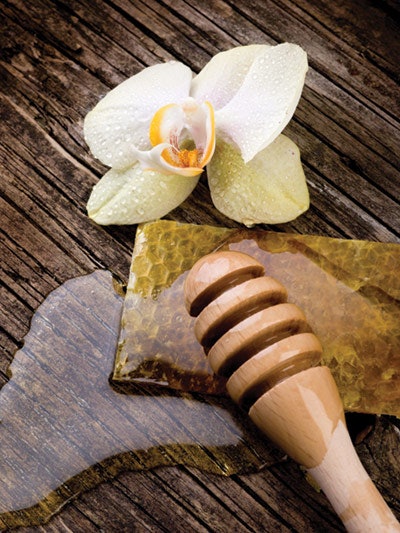
Antimicrobial/Antibacterial. The majority of atopic eczema (90%) has increased Staphylococcus aureus bacteria.6 While this bacteria is naturally found on most people’s skin, high amounts increase the symptoms of eczema including infection. Look for ingredients in skin products that can be antimicrobial and/or antibacterial. Honey is a popular ingredient in skin care that can be beneficial to eczema. The healing property of honey is due to its antibacterial activity, its ability to maintain a moist wound condition and its high viscosity to provide a protective barrier and prevent infection. Some eczema sufferers mix honey and beeswax directly on skin to help with itching and hydrating the skin. Black rice is also found in several skin care lines. It is an anthocyanin with antimicrobial, antibacterial and anti-inflammatory properties.
Hydration. Ceramides could also be helpful in treating eczema clients. Naturally occurring lipids or fats found in the skin, ceramides in skin care can be helpful in hydrating the cells of the top layers of the skin, which will help repair the barrier function. Ceramides by moisturizing may also help in protecting the skin barrier. Hydrating several times a day is key for the eczema client. Shea butter can help hydrate skin with eczema and the raw version is preferred over the processed version to preserve its healing qualities. Shea butter also has vitamin A properties in a natural state, which also may be helpful with skin symptoms.5
Professional Treatments to Avoid
Clients diagnosed with eczema should be treated with “kid gloves” in the treatment room. Besides looking at the ingredients used, skin care professionals also should be wary of equipment facials and massage as these can all potentially have contraindications or side effects that can trigger or worsen the symptoms of eczema. A good way to determine is to have a good intake form and a thorough consultation prior to the first treatment.
Needling. Needling the skin is done more and more these days; however, most caution against this unless done under a physician’s care. An eczema client has a compromised barrier as well as reduced immune function to prevent against infection. There are several contraindications with needling and eczema, especially if the client is on medication.
Microdermabrasion. Microdermabrasion is another type of equipment that has been debated concerning eczema. The type of crystal machines can be too harsh on skin for a client with eczema. Most sources say the use of microderm on an eczema client should not be done. Again, this is another type of equipment that should be done under care of a physician. As estheticians, we do not want to take on possible liabilities of bad reactions that could arise if used.
Peels and enzymes. Peels and enzymes in general can be helpful to many clients, however, treating eczema with these can be tricky. Many eczema sufferers are prescribed medications with salicylic and doing a peel or enzyme on this skin can be a contraindication. With a compromised barrier, the induced flaking or peeling could trigger itching and scratching that can result in bleeding. These types of treatments should also be done under physician care.
Extreme temps. Eczema patients may also have peripheral neuropathy, which may not allow them to tell when something is too hot or cold. It is best to avoid hot steam towels or items in a treatment room that are iced. Lukewarm water would be best. Use rollers and water globes if wanted without refrigerating.6
Massage. Massage can be helpful as stress is a trigger for eczema flare-ups, but keep a few things in mind. Avoiding active flare-ups, as skin can be cracked, sore or bleeding is important. Look for other areas of the body to massage where skin is clear to alleviate stress for the client. A scalp, foot or pressure point massage would be an alternative with no active areas visible. Lymphatic drainage could also be beneficial to help with immune issues associated with eczema and offer some relief.
A Team Effort
Working with the eczema client can be tricky as they will have ups and downs. The intake form will be helpful. Knowing that a client is under a physician’s care and if they are on medications will help determine treatments and home care for a client with eczema. Coordinating with the client’s physician can also be helpful for a “team effort” in helping the client manage their symptoms. You may want to also ask questions regarding triggers for flare-ups to avoid those in the facial. Controlling the triggers will be helpful for both the skin care professional and the client, so they can keep skin in check between treatments.
REFERENCES
- https://nationaleczema.org/eczema/
- www.cosmeticsdesign.com/Regulation-Safety/Report-claims-fragrance-allergies-as-common-culprit-in-skin-conditions
- L Walker, The Skin Care Ingredient Handbook, 65 Allured Business Media: Carol Stream, IL (2014)
- www.netdoctor.co.uk/medicines/skin-and-hair/a3663/antimicrobials/
- www.sheainstitute.com/asbi-library/what-is-shea-butter/
- www.ehealthme.com/cs/neuropathy%20peripheral/eczema/
(All websites accessed June 7, 2017.)
a Cohesium (INCI: Water (aqua) (and) Ophiopogon Japonicas Root Extract) is an ingredient manufactured by Silab.
b L22 (INCI: Jojoba Oil/Macadamia Seed Oil Esters (and) Squalene (plant based) (and) Phytosteryl Macadamiate (and) Phytosterols and Tocopherol) is an ingredient manufactured by Floratech.
Honey is a popular ingredient in skin care that can be beneficial to eczema.
